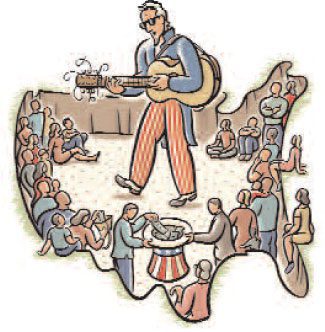
The Simpson-Bowles deficit reduction plan has drawn the usual catcalls. It will cut services. It will raise taxes. It will hurt the poor. Yet, as is always the case when an impartial bipartisan commission issues its recommendations on a dire national problem, none of the critics bothered to sit down and read the report itself. I went through all 25,754 pages this week, and I can honestly say that if Americans simply remain calm and consider some of the suggestions buried in the index, they will be floored by their ingenuity.
Take the Illegal Immigrant Licensing Fee. For many years, pro football fans simply paid the printed ticket price to attend a game. But a few years ago, desperate for revenue to build bigger stadiums, franchises began charging “ticket-holder licensing fees” of between $10,000 and $50,000.
The Commission thinks that a national licensing fee imposed on illegal immigrants would raise enough revenue to cut the federal deficit by $1 trillion. With upwards of 20 million illegals in the country, a one-time citizenship licensing fee of, say, $5,000 would allow illegal immigrants to stay and work in this country while stoking the U.S. economy, thereby creating even more jobs for illegals. “You want a front-row seat at the Cowboys game; you pay a licensing fee,” the Commission reasons. “You want a front-row view in the arena of democracy? You pay a licensing fee.”
A second brilliant suggestion is to tax the fat. The idea, a variation on a proposal by Cornell University economics professor Robert H. Frank, is to tax activities that are harmful to society. This could include polluting, smoking, driving while intoxicated, manslaughter or even performing “Captain Jack” in subway tunnels. But the single best way to reduce the deficit is to tax people for being fat.
“The recalcitrantly chunky put a huge strain on the national health care system,” the Commission notes. “By taxing the pudgy, the chubby, the tubby and perhaps even the pleasingly plump, the government would kill two birds with one stone: cut the deficit in half and use reverse social engineering to produce a thinner, healthier populace.”
Passing the hat is yet another worthy Commission proposal. At sunrise on January 1, 2012, a hat would be ceremonially passed from one American to the next seeking contributions to reduce the federal deficit. If the average American, generous to a fault, stuffed just $100 into the hat, it would slash the deficit by $35 billion.
Not all of the Commission’s suggestions are equally plausible. Seniors will bridle at the Give Granny a Placebo Program, which would cut Medicaid costs 30 percent by periodically feeding senior citizens harmless placebos instead of their usual meds. A one percent civic wage surtax on stoners, too wasted to notice, seems needlessly regressive, as does an excise tax on the dumb. Yet much is to be said for a national 50-50 raffle.
“The single biggest fundraising come-on is the 50-50 raffle,” the Commission reasons. “The deficit is $1.6 trillion. So with a 50-50 split—$800 billion to the winner, $800 billion to the government—everyone wins. We pass a 90 percent windfall tax on the winner, get rid of Amtrak, the Corporation for Public Broadcasting, the State Department and the National Endowment for the Arts, and this problem disappears forever.”
Chief Executive Group exists to improve the performance of U.S. CEOs, senior executives and public-company directors, helping you grow your companies, build your communities and strengthen society. Learn more at chiefexecutivegroup.com.
0

1:00 - 5:00 pm
Over 70% of Executives Surveyed Agree: Many Strategic Planning Efforts Lack Systematic Approach Tips for Enhancing Your Strategic Planning Process
Executives expressed frustration with their current strategic planning process. Issues include:
Steve Rutan and Denise Harrison have put together an afternoon workshop that will provide the tools you need to address these concerns. They have worked with hundreds of executives to develop a systematic approach that will enable your team to make better decisions during strategic planning. Steve and Denise will walk you through exercises for prioritizing your lists and steps that will reset and reinvigorate your process. This will be a hands-on workshop that will enable you to think about your business as you use the tools that are being presented. If you are ready for a Strategic Planning tune-up, select this workshop in your registration form. The additional fee of $695 will be added to your total.

2:00 - 5:00 pm
Female leaders face the same issues all leaders do, but they often face additional challenges too. In this peer session, we will facilitate a discussion of best practices and how to overcome common barriers to help women leaders be more effective within and outside their organizations.
Limited space available.

10:30 - 5:00 pm
General’s Retreat at Hermitage Golf Course
Sponsored by UBS
General’s Retreat, built in 1986 with architect Gary Roger Baird, has been voted the “Best Golf Course in Nashville” and is a “must play” when visiting the Nashville, Tennessee area. With the beautiful setting along the Cumberland River, golfers of all capabilities will thoroughly enjoy the golf, scenery and hospitality.
The golf outing fee includes transportation to and from the hotel, greens/cart fees, use of practice facilities, and boxed lunch. The bus will leave the hotel at 10:30 am for a noon shotgun start and return to the hotel after the cocktail reception following the completion of the round.